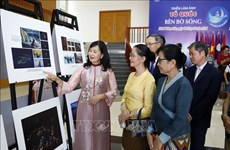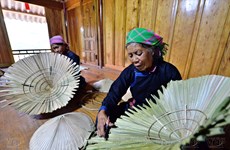Cockscomb flower Tet festival of Cong ethnic people
Hanoi (VNA) - Cockscomb flower Tet festival of Cong ethnic people in the northwestern province of Dien Bien is held in the ninth lunar month every year to welcome the New Year and pray for good weather, bumper crops, good health and peace.
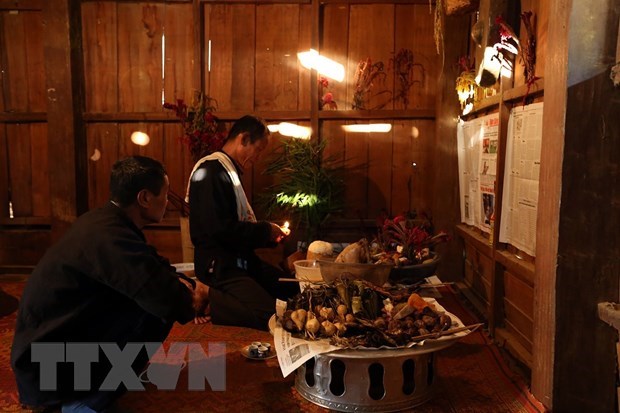 A shaman prepares for worshipping ceremony (Photo: VNA)
A shaman prepares for worshipping ceremony (Photo: VNA)According to customs, before the festival, Cong people choose the most delicious products to offer to their gods and ancestors.
Previously, the festival took place over three to four days, but is now shortened to only one day and one night.
From the early morning, the head of each family will go to the field to pick flowers for home decoration. The cockscomb flower is indispensable as it is the symbol of luck.
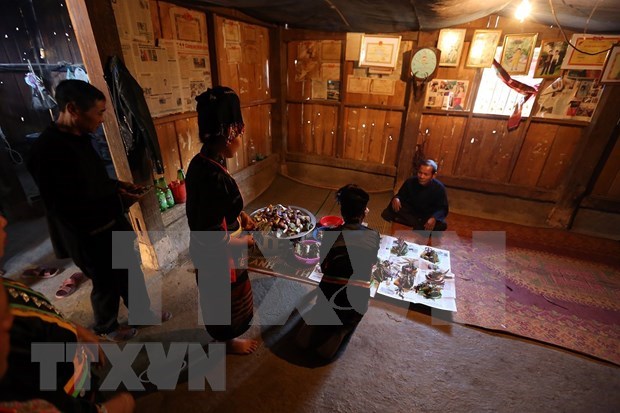
This flower is also considered a bridge to connect the two worlds of yin and yang and the path the ancestral souls take from the sacred world to the place of worship.
The Cong is one of the five ethnic minority groups in Dien Bien, residing in Pung Bon and Huoi Moi villages (Pa Thom commune, Dien Bien district), Nam Ke village (Nam Ke commune, Muong Nhe district), and La Cha village (Pa Tan commune, Nam Po district), with more than 200 households and some 1,000 people.
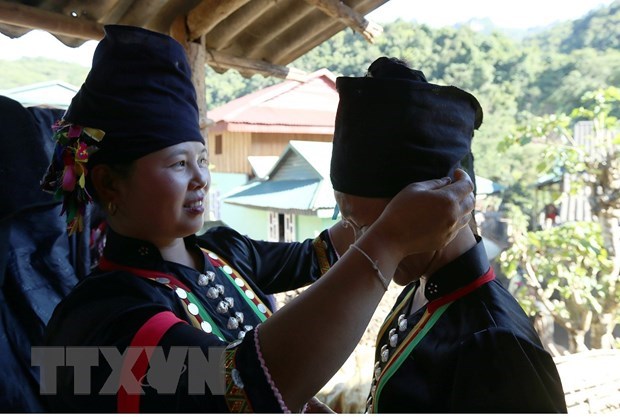 Women from Cong ethnic group prepare costumes before worshipping ceremony (Photo: VNA)
Women from Cong ethnic group prepare costumes before worshipping ceremony (Photo: VNA)In February 2019, the festival was listed among the 17 new national intangible cultural heritages.
“Ga ma thu”, a traditional worship ritual of Ha Nhi ethnic minorities in Sin Thau, Chung Chai, Sen Thuong and leng Su Sin communes of Dien Bien province, was also included in the list.
As one of the 19 ethnic groups in the province, Ha Nhi people have various traditional customs in different events, and “Ga ma thu” is seen as the most important ritual, during which they worship Mother Nature, asking for support from Gods to overcome challenges in their lives.
Days before the ritual, locals prepare six trays of food as offerings to the Gods of Fire, Mountain, Land and Forest, wishing for a year of prosperity, good health, bumper crops and safe cultivation.
Various cultural and sport activities like nem con (throwing a ball through a ring for good luck), danh cu (spinning top) and traditional dances are held during the three-day ritual.
According to Pham Viet Dung, Director of the provincial Department of Culture, Sports and Tourism, with these recognitions, Dien Bien is now home to eight national intangible cultural heritages. The other six heritages are Xoe Thai (traditional dance of Thai ethnic group), Hoang Cong Chat Temple festival, Kin Pang Then festival, Nao Pe Chau festival (new year of Black Mong ethnic group), watering festival of Lao ethnic group and brocading art on traditional clothes of Mong Hoa ethnic people.
The recognition of these two festivals is a vivid illustration of the Party and State’s attention to promoting the unique cultural features of ethnic minority groups, he said, adding that the local culture, sports and tourism sector has helped preserve the traditional rituals and festival of ethnic people in the locality.
Other heritages in the list include “Luon Coi” – traditional singing of Tay ethnic minority group in Pac Nam district, the northern mountainous province of Bac Kan; forging craft of Nung An ethnic minorities in Phuc Sen commune, Quang Uyen district, the northern mountainous province of Cao Bang; Ba Danh Pagoda Festival and Quyen Son “dam” singing, both in Kim Bang district, the northern province of Ha Nam; Trieu Khuc village’s festival in Tan Trieu commune, Thanh Tri district; and “Com” (young sticky rice flakes) making in Me Tri ward, Nam Tu Liem district, Hanoi; “Mo Tham That” ritual of Tay ethnic minorities in Lang Giang commune, Van Ban district and “Then” ritual of Giay ethnic minority group in Bat Xat district of the northern mountainous province of Lao Cai; and “Cap sac” (maturity ritual) of Dao Quan Chet ethnic minorities in Xuan Thuy commune, Yen Lap district, the northern midland province of Phu Tho./.











